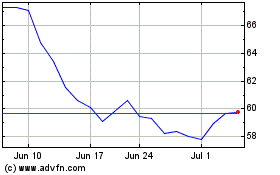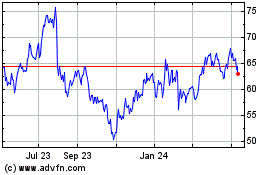PayPal Sues U.S. Regulator Over Prepaid-Card Rule
December 12 2019 - 3:56PM
Dow Jones News
By Yuka Hayashi
WASHINGTON -- PayPal Holdings Inc. sued a federal banking
regulator Wednesday, alleging that its new rule has hampered the
company's ability to offer credit products and has created
confusion among users of its popular digital-payment services
PayPal and Venmo.
The lawsuit challenges the regulation on prepaid accounts rolled
out by the Consumer Financial Protection Bureau in April. While the
rule's primary aim is to improve consumer protection for prepaid
payment cards, it also extends to "digital wallets," any financial
products capable of holding cash balances directly on cards or
electronic devices.
As a result, the rule brought under its coverage digital-payment
tools such as PayPal, Venmo, Alphabet Inc.'s Google Pay, and Square
Inc.'s Cash App, despite the industry's claim that digital wallets
are fundamentally different from prepaid cards, which are often
sold at grocery and drugstores.
The regulation imposes complex requirements on issuers to
disclose fees and other terms of services, while placing limits on
their ability to offer credit products to customers.
"The Bureau's most basic error was ignoring the critical
differences between digital wallets and prepaid products," PayPal
said in its complaint filed with the U.S. District Court for the
District of Columbia. "The resulting regulatory regime is
fundamentally ill-suited to PayPal digital wallets and is likely to
mislead or confuse consumers."
A CFPB spokeswoman didn't respond to requests for comment.
The legal fight underscores the challenge of regulating a
financial product at a time when technology accelerates the
developments of products and services that defy traditional product
definitions. And as industry competition intensifies, expanding
functions of payment products into areas such as consumer loans and
investments becomes essential for companies, industry experts say.
It follows years of intense lobbying by PayPal and other
digital-wallet providers before the rule's issuance to exclude
their products.
"Having exhausted other options, PayPal is filing suit to end
the unsuitable application of the Prepaid Rule and its negative
impact on digital-wallet consumers and our business," PayPal said
in a statement. The rule creates hurdles for marketing of credit
products as it bans consumers from linking credit products to
digital wallets for the first 30 days after they acquire such
products.
"This is a case that could have an impact on our members, their
business partners and most importantly the customers they serve,"
said Brian Tate, chief executive of Innovative Payments
Association, a trade group of prepaid-card issuers, while calling
for its members to fully comply with the rule until a final court
decision is made. The group has also opposed the CFPB rule's
disclosure requirements, but supports its coverage of digital
wallets.
General-purpose reloadable prepaid cards allow users to load
funds directly to a card without having a bank account. Popular
among consumers who don't have full access to financial products,
such cards usually carry a card-network logo such as Visa or
Mastercard.
(END) Dow Jones Newswires
December 12, 2019 15:41 ET (20:41 GMT)
Copyright (c) 2019 Dow Jones & Company, Inc.
PayPal (NASDAQ:PYPL)
Historical Stock Chart
From Mar 2024 to Apr 2024

PayPal (NASDAQ:PYPL)
Historical Stock Chart
From Apr 2023 to Apr 2024
